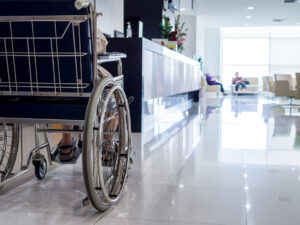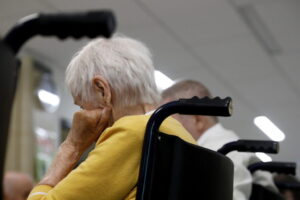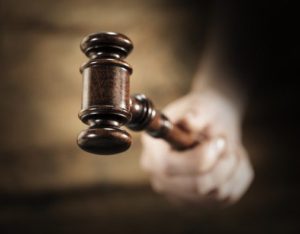
Nursing home abuse and neglect has become widespread and is a growing epidemic. It is a serious problem affecting thousands of nursing home residents who are dependent on nursing homes for care. The fact is, too many nursing home owners act as if profits are more important than resident care. Nurses may be overworked, turnover is sometimes high, and staff may not be able to handle the diverse needs of elders in their care. Nursing home abuse and neglect can be difficult to recognize and are often covered up by nursing home staff. At Dinizulu Law Group, our Chicago nursing home abuse attorneys fight for the rights of the victims and their loved ones.
Nursing home abuse includes assault, battery, sexual assault, sexual battery, rape, unreasonable physical constraint, or prolonged or continual deprivation of food or water. In recent months, there have also been reports of overwhelmed or understaffed nursing homes using psychiatric medication to subdue patients. Use of a physical or chemical restraint or psychotropic medication for any purpose not consistent with that authorized by the physician can also be considered nursing home abuse. In many instances, families are not properly informed about the medications their loved ones are being given. This is why it is so important to ask questions and be vigilant. We entrust nursing homes with the safety and well-being of our elderly parents. That’s what makes nursing home abuse and neglect so heinous. If you suspect that your loved one is suffering from nursing home abuse, consider contacting the Chicago nursing home neglect lawyers at the Dinizulu Law Group, Ltd. Our firm fights for the rights of families who have suffered as a result of nursing home neglect or abuse.
If your elderly relatives have been abused or neglected by a nursing home, don’t let their suffering be in vain. Stop the nursing home from claiming another elderly victim. Call the Dinizulu Law Group, Ltd at (312) 384-1920 to advocate on your behalf. Our Chicago nursing home abuse attorneys have years of experience and the knowledge to help you recover the maximum compensation for your claim.
Warning Signs of Nursing Home Abuse and Neglect
Nursing home abuse and neglect can be difficult to detect. Sometimes diseases like dementia can mask the effects of nursing home neglect. In some instances, families can mistake the regular progression of disease for abuse or neglect. What can you do to protect your loved ones?
The first step is recognizing the warning signs indicating Nursing Home Abuse:
Physical
- Open wounds, cuts, bruises, welts, and/or skin discoloration or deterioration
- Dehydration
- Malnutrition
- Loss of weight
- Burns
Emotional
- Sudden change in behavior
- Emotionally upset or agitation
- Extremely withdrawn or non-communicative
- Unusual behavior (sucking, biting, or rocking)
- Confusion or dementia
Neglect
- Poor personal hygiene
- Withholding medication or over-medication
- Incorrect body position
- Lack of assistance with eating and drinking
- Unsanitary and unclean conditions
- Dirt, soiled bed, fecal or urine odor
These and many other warning signs often go unnoticed by family members. The worst thing to do is to ignore your suspicions. Even the smallest change can be an indication of a much more serious problem. Don’t be afraid to ask questions. Make sure your loved ones are receiving the care they deserve.
 You know your loved one best. Sudden changes in behavior, mood, or health can be indicative of a problem. For instance, certain kinds of medications, when administered to subdue patients, can change their behavior, and attention, and can even lead to serious health complications. Speak to your loved one. Ask him or her how she is doing. If your loved one is not able to speak, talk to the nursing home staff. Ask about daily care. Visit the nursing home unannounced to see how staff treat residents when families are not around.
You know your loved one best. Sudden changes in behavior, mood, or health can be indicative of a problem. For instance, certain kinds of medications, when administered to subdue patients, can change their behavior, and attention, and can even lead to serious health complications. Speak to your loved one. Ask him or her how she is doing. If your loved one is not able to speak, talk to the nursing home staff. Ask about daily care. Visit the nursing home unannounced to see how staff treat residents when families are not around.
Nursing home abuse is a crime. Residents of nursing homes have rights and protections under the law. They have the right to be treated with dignity and respect, and to have their privacy and personal worth protected. They must be informed about their medical care and have the right to make their own decisions regarding their money and services. If your loved one is unable to make decisions on his or her own behalf, family members who have power of attorney to make decisions must be informed about care and medical decisions being made. In 1987, Congress passed the Nursing Home Reform Act which requires each state to issue regulations to protect the rights of nursing home residents. Protecting your loved one’s rights begins with understanding them.
Contact the Chicago nursing home abuse attorneys at Dinizulu Law Group for a FREE consultation. CALL us today at 312-384-1920.
Here are some of the basic rights your loved one has:
- Access and Visitation
Nursing facilities can’t keep a resident from seeing family members, a resident advocate, a physician, service providers, or representatives of the state or federal government. - Accommodation of Need
Nursing homes must adapt their rules and services to a resident’s individual needs and preferences when it is reasonable to do so. For example, residents may keep and use their personal possessions and clothing, unless their health and safety are endangered. - Confidentiality
Residents have the right to keep their personal and clinical records private. - Equal Access to Quality Care
A nursing facility must have the same policies and practices for all individuals, regardless of whether they pay their bills privately or receive benefits from Medicare or Medicaid. - Financial Obligations
Periodically, nursing facilities must tell residents what facility services are covered by Medicare and Medicaid. In addition, the facility must list the services for which residents will be charged and the fees for services. - Free Choice
Residents have the right to: choose their personal physician, be fully informed about their medical care and treatment, participate in planning their care and treatment, and refuse treatment. - Freedom from Abuse and Restraints
Residents have the right to be free from physical or mental abuse. They cannot be kept apart from other residents against their will. They cannot be tied down or given drugs to restrain them if it is not required to treat their medical symptoms. The facility cannot use restraints to punish a resident or to make it easier to care for the resident. - Grievances
Residents have the right to complain about their care or treatment without being punished. They also have the right to have their grievances resolved quickly. - Notice of Rights
When a resident is admitted to a nursing facility, staff must inform the resident about his or her rights. The facility must provide a written statement of these rights if a resident asks for it. - Participation in Resident and Family Groups
Residents have the right to participate in social, religious, and community activities that do not interfere with the rights of other residents. - Personal Funds
Nursing facilities may not require residents to deposit their personal funds with the facility. However, a resident can ask a nursing home to manage his or her personal funds. In this case, the facility must follow state and federal recordkeeping requirements. - Privacy
Residents have the right to privacy. This right includes their rooms, medical treatment, communications (including telephone conversations), visits, and meetings with family or resident groups. - Records and Surveys
A resident has the right to review his or her medical records within 24 hours after making a request. A resident also has the right to examine the results of the facility’s most recent survey and the plan of correction, if there is one. - Relocation
Residents must receive notice before their room or roommate is changed. Residents can refuse transfer to another room if the purpose of the transfer is to move the resident from a Medicare bed to a Medicaid bed or vice versa. - Transfer and Discharge
Residents have the right to remain in the nursing home. They cannot be moved unless the transfer or discharge is: (1) necessary to meet the resident’s welfare; (2) appropriate because the resident no longer needs the facility’s services; (3) necessary to prevent endangering the health or safety of other individuals in the facility; (4) based on the resident’s failure to pay, after reasonable notice; or (5) required because the facility has ceased to operate.
The resident and a family member or legal representative must be given at least 30 days’ notice of a proposed transfer/discharge and must be informed of the resident’s right to appeal. The facility must prepare the resident so the transfer/discharge is safe and orderly. - Transfer for Hospitalization
Before transferring a resident for hospitalization or therapeutic leave, a facility must give the resident written notice of how long it will reserve the resident’s spot open, awaiting the resident’s return. This is called a “bedhold period.” - Priority Readmission
A nursing home resident who remains in the hospital or on therapeutic leave after the bedhold period expires must be readmitted to the facility immediately when a semi-private bed becomes available.
Understanding your rights and the rights of your loved one is an important step in ensuring that your loved one gets the care he or she needs and deserves. However, families may not always know what to do or what steps they should take if their rights have been violated. You may only have a limited amount of time to seek justice if you believe your loved one has not received the quality care he or she deserves. Contact the Chicago nursing home abuse lawyers at the Dinizulu Law Group, Ltd. today to learn more and to protect your rights.
Dinizulu Law Groups Experienced Nursing Home Abuse Attorneys
Justice for Families and the Elderly
If you believe one of the above legal rights has been violated, you should consider contacting an attorney who concentrates on nursing home abuse. If you or a loved one has suffered as a result of a work-related injury call the Chicago nursing home abuse attorneys at the Dinizulu Law Group, Ltd. at (312) 384-1920 to advocate on your behalf. The initial consultation is free of charge, and if we agree to handle your case, we will work on a contingency fee basis, which means we get paid for our services only if there is a monetary recovery of funds. In many cases, a lawsuit must be filed before an applicable expiration date, known as a statute of limitations so please call right away to ensure that you do not waive your right to possible compensation.Our firm can fight for your right to receive compensation for pain and suffering, lost wages, rehabilitative care, and other damages related to nursing home abuse and neglect. Protect your rights. Contact our firm today.
Chicago Nursing Home Neglect Law Firm
Has your loved one been a victim of nursing home neglect in Chicago, Illinois? 40% of deaths due to Covid-19 are linked to nursing homes according to the New York Times. The Times reports that 62,000 nursing home residents have died from the virus. Now, many of those families are asking for answers. Some families were kept in the dark about what was happening at their loved one’s nursing home. Across the nation, we are hearing stories about the breakdown of communication between families and staff, failure of staff to properly isolate sick residents or to seek more critical medical care for sick residents in time. In other situations, nursing homes didn’t have emergency plans in place, didn’t have enough protective equipment, and overall failed to properly care for the residents in their nursing homes.
The Dinizulu Law Group, Ltd. is a nursing home neglect law firm in Chicago, Illinois that works with families who have lost a loved one due to COVID-19 or whose loved one was injured in a nursing home due to nursing home neglect or elder abuse. If your loved one died of COVID-19 and you are looking for answers, or if a loved one suffered an injury in a nursing home and you have questions, reach out to the nursing home negligence attorney at the Dinizulu Law Group, Ltd. in Chicago, Illinois today. We are here to help you.
Nursing Home Responsibilities During the COVID-19 Outbreak
Nursing home populations are particularly vulnerable to the worst symptoms of Covid-19. Older Americans and Americans with underlying health conditions are particularly at risk of developing severe illness and dying from their illness. Because of these unique risks, nursing home staff and leaders have a special responsibility to prepare for and to prevent outbreaks before they happen. According to the Centers for Disease Control, every nursing home should have one person on staff to provide management of infection prevention and control. Does your loved one’s nursing home have a staff member assigned to infection prevention and control? Now might be the time to find out.
Some basic infection control strategies include requiring visitors and staff to wear face masks at all times. If residents can wear face masks, they should be required to do so when they are in common areas. Nursing homes should screen visitors and possibly take steps to limit the number of visitors by restricting visitation to certain areas and limiting visitor’s hours to prevent the spread of disease. Nursing homes should also educate visitors, families, and residents about how COVID-19 spreads and about the unique needs that nursing home residents have.
Nursing homes should also have a clear plan in place for testing residents and isolating residents should a resident get sick. When it comes to monitoring nursing home staff, nursing homes should have flexible sick leave and encourage workers to stay home should they feel sick. Nursing homes should also have a staffing plan in place should multiple staff fall ill at once. Staff should also be screened for fevers before they interact with residents and be sent home if they have a fever. Finally, nursing homes should also make sure to have sufficient personal protective equipment available for staff, have sufficient hand sanitizer, and implement proper sanitizing procedures.
These are just some of the most basic procedures that should be in place. There has been more than enough time for all nursing homes across the nation to implement a proper safety plan. Does your loved one’s nursing home have one? If your loved one has fallen ill with COVID-19, you may want to ask your loved one’s nursing home what plan is in place to handle an outbreak. If you lost a loved one to COVID-19 and your loved one was in the care of a nursing home, you may have many questions. The Chicago nursing home neglect lawyers at the Dinizulu Law Group may be able to help you ask these questions and get answers. Our nursing home negligence law firm in Chicago, Illinois fights for the rights of families who have suffered losses because of nursing home neglect.
Elder Abuse Law Firm in Chicago, Illinois

Nursing home residents are vulnerable members of the population and are more at risk of abuse. What is elder abuse? Elder abuse includes physical violence, including physical punishment, hitting, slapping, or restraining an elderly person in any way. Locking an elderly person in their room is a form of elder abuse. Emotional abuse is a form of psychological abuse that can include yelling at the elderly resident, ignoring him or her, threatening him or her, or preventing close relatives or friends from seeing the elderly person. Financial abuse is when another person takes an elder’s money through manipulation or by stealing from him or her outright. Elder abuse can also include elder sexual abuse.
The signs of elder abuse can sometimes be subtle. Watch for new unexplained bruises, changes in your loved one’s appearance or mood, changes in weight, withdrawal or lack of interest in former activities, or the development of bed sores. If your loved one is wearing broken eyeglasses, shows signs of neglect, or is living in unsafe conditions, this could also be a sign of elder abuse. The Dinizulu Law Group, Ltd. is an elder abuse law firm in Chicago, Illinois that may be able to help you and your family seek justice if your loved one was abused. Our nursing home negligence attorney works closely with families in Chicago, Illinois to help them seek justice for their losses following instances of elder abuse or neglect. If you believe your loved one has suffered because of negligence or abuse on the part of a nursing home, the Chicago nursing home negligence lawyers at the Dinizulu Law Group are here to help you.



